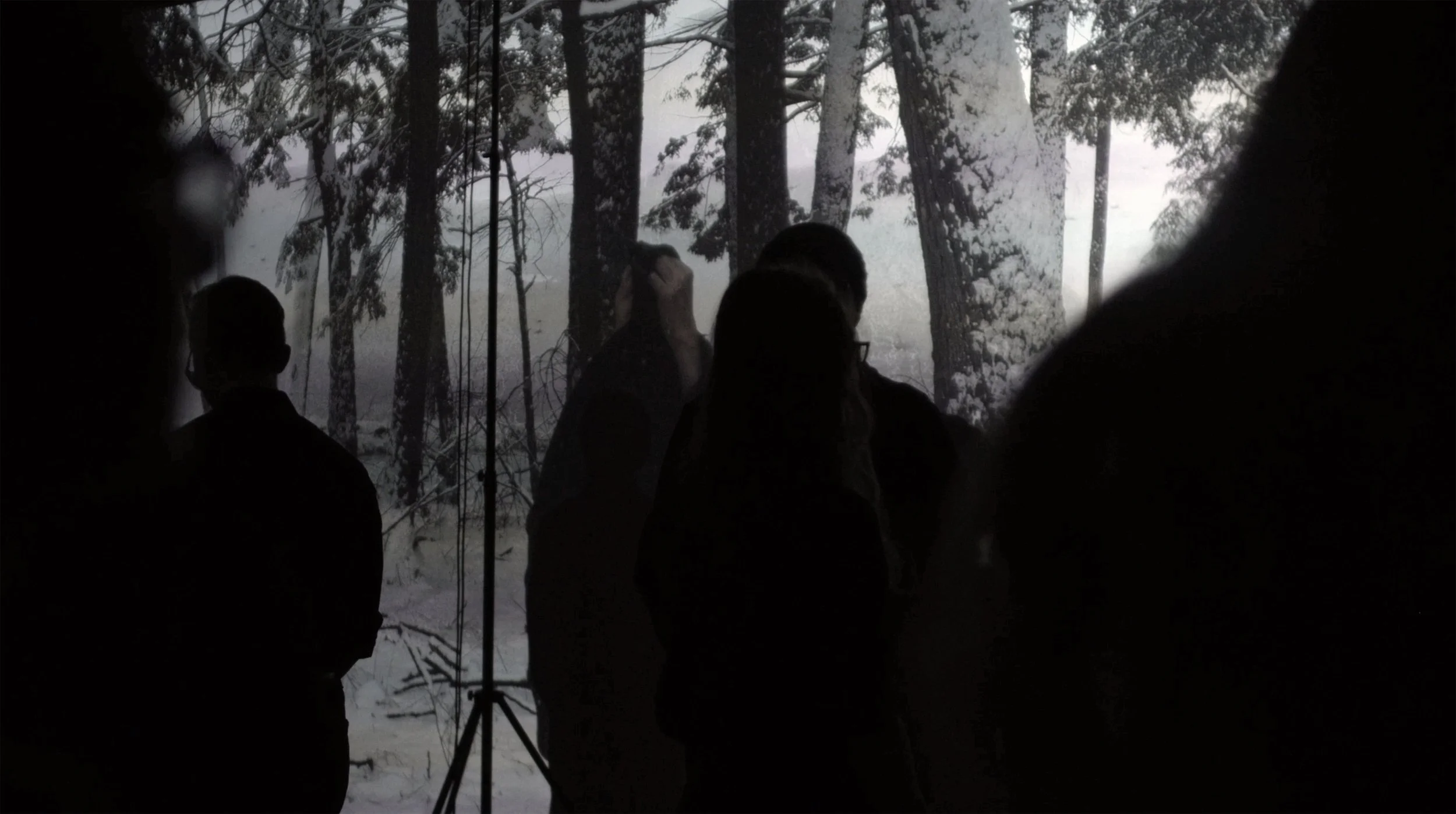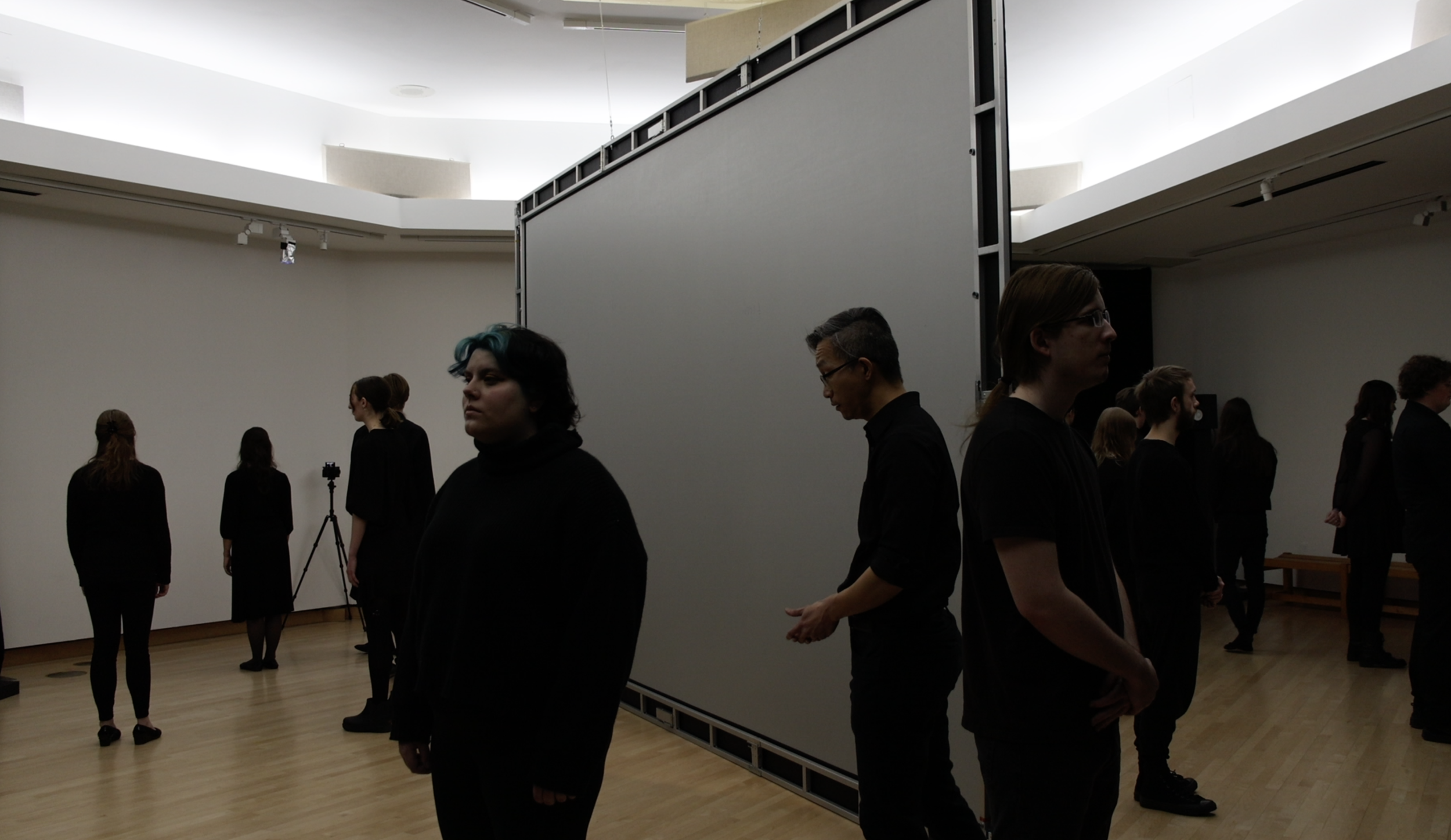Orgé
Music composed by and movement choreography by Monika Weiss
Duration: 20 minutes Vocalists: Kelly Beckman, Katie Beyers, Ingrid Piazza, Rachel Jones, Heather Kays, Dean Moran, Alex Weckiewicz, Bei Qi, Brea Youngblood
Movement performers: Eva Aguero, Jungsoo Kim, Lourdes del Mar Santiago Lebrón, Tess Losada-Tindall, Erin McLaughlin, Susan Pasek
Orgē (2022) belongs to an ongoing series of vocal and choreographed projects by New York-based Polish intermedia artist Monika Weiss. Originally inspired by the ongoing invasion of Ukraine, Orgē is dedicated to all victims of wars, invasions, and colonial occupations. Conceived as a site-specific choral environment, the piece resembles a forest of voices. “The power of Weiss’s artistic message channels ancient performative vocal tradition of lament—as well as her live-long relationship to and practice of music (the artist was first educated as a pianist and classical musician)—transforms the viewers experience of time and space into a new sonic and visual landscape, and with the participating vocalists or movement performers contribution to the act, like in Orgé, 2022, the piece becomes a collective body.” (Izabela Gola). The premiere of Orgé took place in 2022 at Furlong Gallery, University of Wisconsin at Stout, Menomonie, Wisconsin, curated by Izabela Gola and Robert Atwell, in collaboration with Jerry (Chiwei) Hui as part of To Freedom program.
The 2024 edition of Orgē is organized in collaboration with Laumeier Sculpture Park and Stephen and Peter Sachs Museum, Missouri Botanical Garden—curated jointly by Nezka Pfeifer (museum curator, Stephen and Peter Sachs Museum) and Dana Turkovic (curator, Laumeier Sculpture Park). Recorded on 2024/09/14.
Orgé, 2022. View of the live performance at Furlong Gallery, University of Wisconsin at Stout, Menomonie, Wisconsin, curated by Izabela Gola and Robert Atwell, in collaboration with Jerry (Chiwei) Hui
orgé
2022
composition for unlimited number of voices and space, with or without a projection
duration: 20 min.
this work is site-specific and may be performed indoors or in a park
this work, which was originally responding the invasion of Ukraine, is dedicated to all who currently perish in wars waged against them
At the Furlong gallery, Orgé was choreographed for the architecture of the gallery space. A double-sided and suspended from the ceiling projection screen was equal to the size of the room and installed throughout the middle of the space, allowing performers and the audience members to walk around it. Onto this double sided screen a film still was projected, from the artist’s Koiman II - Years Without Summers (24 Nocturnes), creating an experience of being immersed in a dark, wintery landscape and relating to idea of the symbolic darkness and coldness of the horror of war waged against Ukraine [to read more about Koiman II (Years Without Summers) click here]
below: documentation of live performance of Orgé at Furlong Gallery, University of Wisconsin at Stout (filmed documentation by Parker Cmeyla)
Credits
composed and choreographed by Monika Weiss
live premiere of Orgé took place at University of Wisconsin at Stout, with participation of UW-Stout Symphonic Singers and Chamber Choir directed by Jerry (Chiwei) Hui
singing/walking voices (Wonderers): Min Bucheger, August Galeazzi, Izabela Gola, Jerry Hui, and Kat Schlauderaff
murmuring/standing voices (Trees): Aaron Windsor, Amber Conner, Anne Ruehmann, Bri Greenlee, Calvin Anich, Celia Powell, Colin Kintzinger, Colin Poulakos, Connor Donnelly, Emily Sorem, Garrett Pals, Jackson Koverman, Jacole Einfeldt, Keegan Mayr, Kyran Luikens, Leah Leivermann, Mary Spaeth, Michaela Gifford, Naan Fowler, Natalie Watters, Owin Korfmacher, Reece Halda, Samuel Wilde, Sarah Flock, Sarah Korte, Spencer Sveen, Steven Lee, Taylor Ottum, and Victoria Dawley
The project premiere was possible thanks to the support of University of Wisconsin at Stout, Polish Cultural Institute New York, and Sam Fox School of Design & Visual Arts at Washington University in St. Louis
Artist Statement
Orgé is an ancient Greek word which means “wrath”. It comes from the verb orago meaning, “to teem, to swell” and thus implies not a sudden outburst, but rather a permanent, established, and passionate feeling, solidifying what the beholder considers wrong. In my art, the musical and choreographed Lament connotes power and resistance through silence, sound and movement. Orgé is conceived as a site-specific choral and sculptural environment resembling a forest of voices.
I have divided the vocalists into those who murmur standing, resembling Trees, interspersed throughout the space, and those who are Wonderers, moving through space very slowly while singing composed phrases. Vocalists include untrained and trained musicians. Audience members can stand or seat around, on the periphery of this vocal field, or may walk through the vocal field in order to experience being on the inside of Orgé. Walking themselves, slowly, through the chorus of tree-like standing figures of vocalists, following the Wanderers, the audience members experience the stillness and thickness of the sustained choral sound. Orgé is performed as a protest against the speciific war, but also any war. It is also meant as an expression of sonic and ethical beauty, aiming symbolically towards a possibility of freedom. As an artist I believe that the sonic, embodied gesture of lamentation is potentially a revolutionary act that embraces emancipation as a vision of the future, in which history can no longer erase memory, just as the lost and raped lives of the people of Ukraine will never surrender to erasure from public memory.
- Monika Weiss
Essay Excerpt
The power of Weiss’ artistic message channels ancient performative vocal tradition of lament—as well as her live-long relationship to, and practice of, music (the artist was first educated as a pianist and classical musician)—transforms the viewer’s experience of time and space into a new sonic and visual landscape. With the participating vocalists and movement performers contribution to the act, like in Weiss’ Orgé, 2022, the piece becomes a collective body.
Through this intersection of the personal and the public in Orgé, a forest of performative bodies, created a spiritual body in an articulated, humanistic act of protest against war and violence […] There is a specific sonic stillness between acts, to which audience members as well as performers should pay special attention to, an interim space of dense sonic textures that focus listening attention inward and transform the participants from intimate individual bodily experience to an articulated collective conscious presence, a collective body. Monika Weiss’ Orgé is conceived as site-specific vocal music and as choreography of stillness. Every time it will be performed it will transform, depending on the physical surroundings and the number of participating vocalists.
- Izabela Gola, Monika Weiss’ Lament as an Act of Protest, Polish Cultural Institute New York, 2023 (to read full text click here)
Exhibition
Monika Weiss: Orgé , Furlong Gallery, University of Wisconsin-Stout, Menomonie; 2022, curated by Izabela Gola and Robert Attwell, as part of To Freedom program of events organized by Jerry (Chiwei) Hui
Orgé, 2022. View of the second vocal recording session at Furlong Gallery, University of Wisconsin at Stout, Menomonie, Wisconsin, curated by Izabela Gola and Robert Atwell, in collaboration with Jerry (Chiwei) Hui

